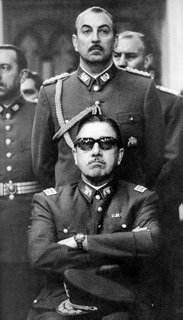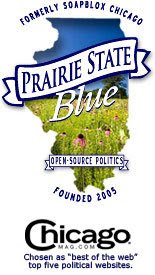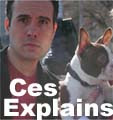The conservative, free-market "Chicago School" of economics lost its leading thinker Thursday with the death of Nobel Prize winner Milton Friedman at age 94.The Chilean "reform-minded leader" to which the Tribune's Greg Burns refers is General Augusto José Ramón Pinochet Ugarte.
For decades, Friedman tirelessly promoted his belief that private competition works better than government mandates, influencing the Nixon, Ford and Reagan administrations as well as reform-minded leaders from Chile to China.
 Gen. Pincochet lead the military junta that ended South America's oldest democracy via a violent coup deposing the nation's democratically elected President Slavador Allende. During Gen. Pinochet's war on his nation's elected government, the army surrounded the presidential palace to prevent any escape -- while the air force bombed it. President Allende died from a gunshot wound before he could be captured.
Gen. Pincochet lead the military junta that ended South America's oldest democracy via a violent coup deposing the nation's democratically elected President Slavador Allende. During Gen. Pinochet's war on his nation's elected government, the army surrounded the presidential palace to prevent any escape -- while the air force bombed it. President Allende died from a gunshot wound before he could be captured.Gen. Pinoche ruled Chile from 1973 to 1990, during which his regime was responsible for tens of thousands of human rights violations and murders. Those murdered during Pinochet's rule were said to have "been disappeared."
It is unknown exactly how many Chileans were killed by government and military forces during Gen. Pinoche's reign, but The National Commission for Truth and Reconciliation Report listed 2,095 deaths and 1,102 "disappearances" -- with the vast majority of victims coming from Gen. Pinochet's political opposition.
Pinochet's police and military also routinely used torture against dissidents. The National Commission on Political Prisoners and Torture determined that no less than 28,000 people were abused by the regime.
During his military dictatorship, Gen. Pinochet launched an era of economic libertarianism and privatization. To formulate his economic policy, Gen. Pinochet relied on the so-called "Chicago Boys," who were economists trained at the University of Chicago and heavily influenced by the monetarist policies of Milton Friedman. Gen. Pinochet's "shock treatment" policies -- abolition of the minimum wage, trade union rights, the privatization of the pension system, state industries, and banks, and slashing of taxes on income and profits -- were dubbed "The Miracle of Chile" by Milton Friedman.
But what did the Pinochet/Friedman "Chilean Miracle" look like?
In 1973, prior to the implementation of Friedman's policies, Chilean unemployment was only 4.3%. Following ten years of Gen. Pinochet's rule in 1983, unemployment had rocketed to 22% and wages adjusted for inflation declined by more than 40%. In 1970, 20% of Chile's population lived in poverty. By1990, the last year of Gen. Pinochet's Friedman-style economics, poverty had doubled to 40%.
With regard to bare necessities, in 1970, the daily diet of the poorest 40 percent of the Chilean population contained 2,019 calories. By 1980 this had plunged to 1,751. In addition, the percentage of Chileans without adequate housing jumped from 27 to 40 percent between 1972 and 1988.
And how were things going on the other side of the tracks? In 1970, the richest one-fifth of the population controlled 45% of the wealth compared to 7.6% for the poorest one-fifth. In 1989, the wealth controlled by the richest one-fifth jumped to 55% of the wealth while the wealth controlled by the poorest one-fifth fell to just 4.4%.
Of course we are all familiar with China's "reform-minded leaders".
Gen. Pinochet offered Milton Friedman the opportunity to use the nation of Chile as the living laboratory for his economic experiments and the Chilean people as his guinea pigs. And Milton Friedman was so eager to conduct his economic experiments on the human beings of a real nation that he worked hand-in-glove with one of this hemisphere's worst human rights abusers and legitimized the monster who destroyed his nation's democracy.
These are just some things we should keep in mind when considering the legacy of Milton Freedman. And that we should keep in mind if, during a future election campaign, the Tribune endorses a "reform-minded leader."













2 comments:
It is quite fair to blame Mr. Friedman for his efforts to legitimize the military junta in Chile by ratifying its economic policies while simultaneously ignoring its multitude of human rights abuses including murder.
And Mr. Friedman's economic theories were "mis-used" in Chile. Wouldn't you agree that the Friedman disciples that descended from the University of Chicago, the ones that implemented them in Chile, knew Mr. Friedman's theories better than anyone other than the master himself? Mr. Friedman's theories -- and the Chilean "shock treatment" that was its logical offspring -- are based on his central view that labor is a mere commodity. When labor is just a commodity, laborers are just a commodity. And that is exactly how the Chicago Boys' "shock treatment" treated laborers, i.e. citizens.
But how could anyone be surprised when inhumane behavior results from such an openly dehumanizing premise?
And Milton Friedman was no shrinking violet. Had he believed that his theory of the market was being "mis-used" by his students in Chile, he could have -- would have -- said so at the time. But instead, he embraced those who implemented them and only fretted that they didn't go far enough.
Hear, hear, SCAM. Tell it like it is.
Post a Comment